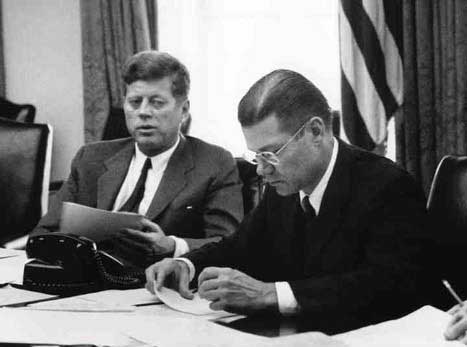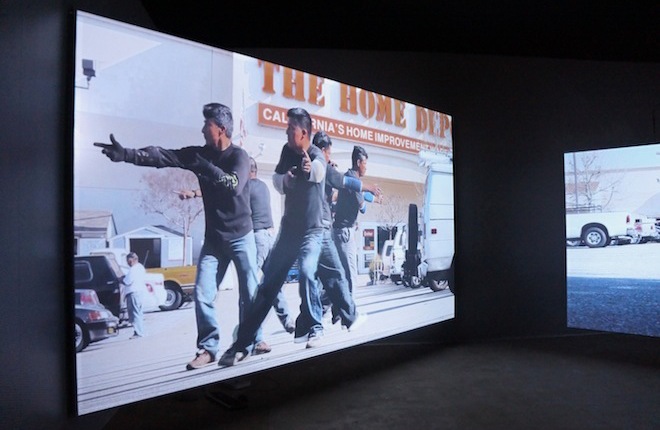The film’s director, Errol Morris (who did most of the interviews a short walk from where I saw the film in Cambridge) asserts in his director’s statement that The Fog of War is “neither a work of biography nor of history.” Yet he apparently chose McNamara as a subject because "more than anyone else, he embodies the twentieth century."(2) In Morris’ recent works his subjects have been eccentrics: in Fast Cheap & Out of Control, a hairless mole rat enthusiast (among others), in Mr. Death, an execution device designer who was hired by a Neo-Nazi group to disprove that the holocaust took place. It is hard to consider Mr. McNamara as an eccentric, however Morris has constructed all of these films the same way. He attempts to be as objective as possible and even invented a filming apparatus, which his wife, Julia Sheehan, named the “Interrotron.” This device allows Morris and his subjects to look each other directly in the eye (by way of a mirror and television screen) while looking directly into the camera at the same time. This creates a less mediated experience for the viewer, as the subject appears to be directly addressing the audience. Whether or not we find his subjects morally reprehensible or not is not dictated by Morris’ film, but is up to us as viewers. It is not as though Morris does not himself take issue with McNamara’s past as we hear his unedited retorts and questions to McNamara’s diatribe from time to time during the film.
In one of these instances, we hear Morris try to initiate a dialogue about McNamara’s controversial Viet Nam years and he resists, telling Morris that he wants to talk about some other things first. McNamara takes this opportunity to talk about his time working for the Ford Motor Company and his role in the introduction of safety-belts the 1950’s, something that has easily saved millions of lives by now. McNamara’s desire to introduce this into the interviewing process at the mention of Viet Nam suggests his anxiety over being unfavorably represented in Morris’ film. The introduction of safety belts into cars is irrefutably a beneficial contribution to society, despite the fact that they were, in part, introduced to sell more Fords. Out of the 25 hours of footage that Morris had of McNamara, he not only chose this particular instance, but also chose not to edit out his own attempt to discuss the Viet Nam war. Not only does this sequence confirm McNamara’s own fears about his past, but it also destabilizes his position as moral authority and sole voice of the film. Though this may also imply Morris’ liberal inclinations about U.S. history, it demonstates beyond question his interest in McNamara as a person, and not what makes up his history.
The confusion and disappointment many viewers may experience when the film ends is due to their familiarity to the rhetoric common to popular journalism with its ever-present spin or bias -- an ostensible pro or con that is made apparent by an editor or producer. But this piece of journalism (if you will) is devoid of most editorial spin. The only narrative woven in the film is that by McNamara, not Errol Morris. For the most part, Morris’ clever editing and inter-splicing of stock footage brings the film to a seamless cogency and keeps the viewer well stimulated -- this non-didactic structure makes for a more interesting work. Many critics have scrutinized Morris for being too soft on McNamara, but he is not making a film about his standpoint on Robert S. McNamara – the apparent Conniving Plotter of the Viet Nam War. Furthermore, in order to make an objective film, Morris’ approach can be nothing but amoral. Others have criticized just what McNamara says in the film, perhaps because Morris’ film itself has so little of the familiar rhetoric for them to critique.
Regardless, this film is one of the most important and relevant films of this terror era. One can easily interchange characters of McNamara’s story about Viet Nam or the Cuban Missile Crisis with the current administration’s saga in the Middle East. Ignorance of these parallels by future generations could only ensure sequel upon sequel.
----
1. McNamara uses the phrases “son of a bitch” and “war criminal” as referents for himself in the film.
2. As reported by Eric Alterman in his Nation column “Stop the Presses” on 26 November.
Errol Morris’ “Fog of War” is currently playing at: Kendall Square Cinema, Cambridge; Embassy Cinema, Waltham and Coolidge Corner Theater, Brookline.
Errol Morris
The Fog of War website



